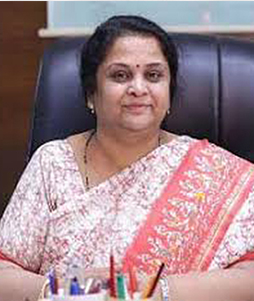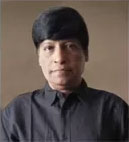
Optimism is not just the faith that leads to achievement; it is also the opium of life. It serves as a strategy for making a better future because unless one believes that the future can be better, one is unlikely to step up and take responsibility for making it so. Its very essence signifies inspiration, vitality, hope; and where others have resigned; it enables an individual to hold head high. For Ms Aruna Limaye Sharma, retired IAS officer of the 1982 batch from the Madhya Pradesh cadre, optimism is not just a Teflon-coated word but an abiding rationale and a way of life.
The highly diligent officer, an ardent practitioner of Development Economics, has retired as Secretary; Steel in Government of India but has refused to hang up her boots. She has conceived and launched governance software like Samagra (now in over 10 states) and as member of the 5-member high-level committee of RBI; has been instrumental in deepening digital payment. Paralelly, she is also on the Governing Board of the Microfinance Institutions Network MFIN) at a time when the sector is witnessing many positive changes. Her writings are published by UNDP, FAO, national and international journals of repute like DPR
With a Master’s in Development Studies from the University of Bath (UK) and a Doctorate in Development Economics from the University of Delhi, Ms Sharma has been relentlessly championing the cause of sustainable development – an issue that she speaks about passionately in her book “You@ Game Changer for Inclusive Growth.” A staunch votary of Development, she maintains that there can be no sustainable development and lasting peace in a society which has a widening gap between the rich and the poor.
In a lucid style, the 142-page book lists a litany of challenges that hamper sustainable growth and development in villages, smaller towns and urban slums in India. Enumerating the key takeaways of the book she argues “elected representatives starting from sarpanch, to mayor and MLAs to MPs, not to speak of even rookie bureaucrats harbour the impression that the best of infrastructure is not happening due to paucity of funds. I have tried to demolish that myth with a Four- stair approach, One infrastructure. Even the smallest of Panchayats with a 1500 population and 500 households gets crores per annum. What is needed is convergent, focused approach alongside the use of Samagra so that social protection entitlements percolate to all and no one is left out for want of new opportunities of livelihood. The book is ready-reckoner for those who intend to transform and bring in the concept of Smart Village and Smart Wards.”
Beyond professional duties, Ms Sharma is active on twitter and expresses herself with clarity and precision. Quite surprisingly, her decision to join the civil services was more by accident than design. “It was (the decision) accidental. After graduation, I pondered seriously on the career I could visualize for myself. Being active in student life, I surmised that civil services will provide me with platforms for out-of-box thinking. The preparation for IAS for one full year is a serious affair. One has to cover the entire gamut of syllabus and cannot be selective in covering topics. One needs to focus on understanding the basics first and then do an in-depth study. A superficial approach does not work,” she points out.
In her 38 years of professional career, Ms Sharma has served a number of postings and at times she was even straddling multiple postings but each office was handled with distinction. Some of them were challenging but as she elucidates her experiences, it is obvious that her courage of conviction and stoicism stood her in great stead while negotiating the rigours of her calling. She explains: “Initial postings of under training, SDM, Addl Collector are in quick succession but once you become the collector, you become stable. Many times I held a dual charge. In my career I had around 13-14 postings with stability of 3 years on an average enabling me to stabilize the initiatives taken.
For Ms Sharma, every posting began on a clean slate. She made no distinction about any posting being better than the other. “Each of my postings gave me complete satisfaction — whether in districts triggering systematic development, approach to law and order or later in sectors like Dairy Development, Information Technology or Steel. If I look back to gauge at the Highest Common Factor, I am happy I could approach issues head-on and build up teams when these sectors were confronted with crises. Joint efforts enabled a system-based approach that not only gave success but also sustainable success. During my stint in Dairy Development, no salaries were disbursed for a year with huge market dues. The revival of this sector introduced the concept of ‘Resource Convergence’ by converging similar schemes for same objectives and that was incorporated in the Eleventh Plan at the national level.”
Ms Sharma also recalls with satisfaction how the development sector brought about Samagra, a common household database for all the schemes and G2P of Government whether central or state. It is now adapted in 8 states and concept is now enlarging not only to the rest of the country but even across the border. The quality telecast of CWG 2010 whose preparatory levels were inordinately delayed but Doordarshan managed to win accolades apart from a successful revenue model. With an efficacious approach, I could develop a common scholarship portal and GeM (Government e-Marketplace) as a challenge for a common platform to aggregate government procurement. The Steel Policy 2017 not only pulled the sector out of difficult times, it also laid the roadmap. What I am trying to underscore here is the common thread to successfully meet the challenges lies in adopting a ‘holistic’ approach and striving to plug gaps. This calls for clarity of objective and the will to achieve.”
Ms Sharma shares a constant rapport with her twitter constituency. What makes her popular is her penchants to analyze issues clinically, take holistic approach and then rationalize, thereby resonating well with more and more readers. True to her self-effacing nature, she makes light of the numerous awards and recognition that she earned in the line of her eventful career and instead of listing or counting them, dedicates them to her team.
The question of striking a work-life balance becomes redundant when one is always in a positive state of mind. Ms Sharma has never let go of her alacrity even in utmost trying situations. Positivity has been her driving force in an occupation that constantly calls for physical and mental readiness. “I focus on worth ethic and team belief to excel in professional life and to enjoy every small thing in personal life. I believe these are separate compartments.”
A compelling part of her personality is her dogmatic belief in Indian traditions. “I was brought up by my parents firmly rooted in Indian traditions. I love classical music and dance and did acquire some skills, but that is a very personal hobby. Having said that, I do believe that good intentions need to be shared, she adds, explaining clearly what keeps her going even after retirement. I am a die-hard optimistic and believe in the goodness of people. Positive thinking and systematic approach supported by hard work is the mantra for success in any endeavour. Work is never a burden if you are passionate about it because you do best and get best.
That she genuinely feels so; reverberates with that one interesting one-liner on the twitter: “After hard day’s work always boggled with what to eat, #MyMenu365 will give 365 different options, no repeat.” Little wonder, her plate is always full.

A Column By
Raju Korti – Editor
The Resource 24X7
A Journalist With 4 Decades of Experience With Leading Media Houses.
